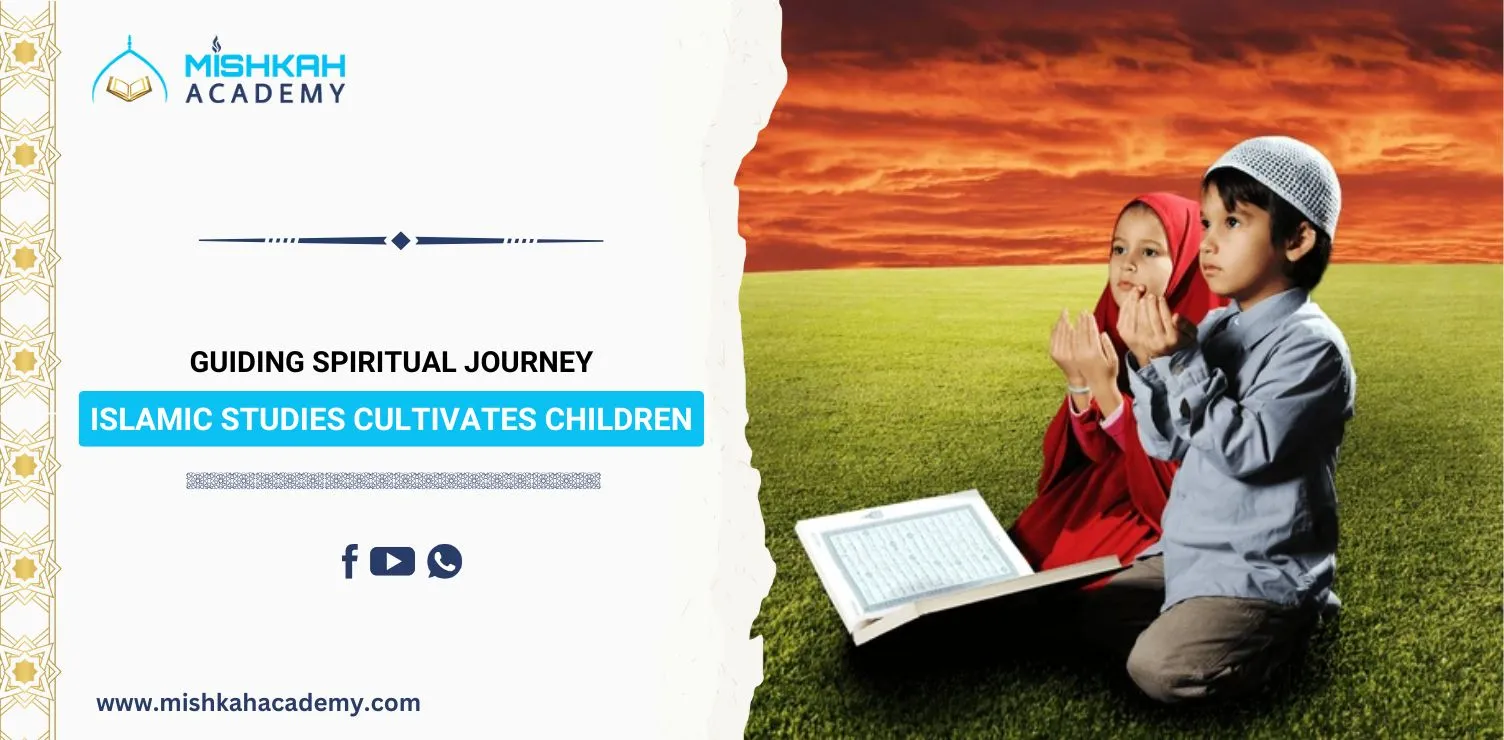Islamic studies play a crucial role in shaping a child’s character and behavior from an early age. Parents should start early to teach their children essential Islamic values, as it strengthens moral foundations, encourages compassion, and instills respect for parents and elders.
Learning about practices like daily prayers, fasting, and zakat helps children build self-discipline, accountability, and a strong sense of community. Islamic studies for kids also promote honesty, integrity, and empathy, helping children understand the importance of kindness and generosity. These values contribute to a balanced and purposeful life, guiding children toward responsible, ethical behavior.
10 Reasons Why Islamic Studies Cultivates Children
Table of Contents
Toggle1. Building Strong Moral Foundations Through Faith and Values
Islamic studies introduce children to core moral values through faith, helping them develop a strong character. For example, when children learn about honesty, kindness, and justice from an early age, they understand right from wrong naturally.
The Prophet Muhammad (peace be upon him) said,
“The best of you are those who have the best manners and character” (Sahih al-Bukhari, 3559).
This guidance encourages children to act with integrity in every situation. Studies show that values instilled at a young age create long-term behavioral patterns.
2. Encouraging Compassion and Empathy in Everyday Life
Teaching compassion helps children understand and care for others, creating a nurturing environment. Islam emphasizes kindness, with the Prophet Muhammad (peace be upon him) saying,
“Whoever is not merciful to others will not be treated mercifully” (Sahih al-Bukhari, 5997).
This builds emotional intelligence, a vital skill for healthy social interactions. Scientific research suggests that children who learn empathy are more likely to succeed socially and form meaningful relationships.
3. Instilling Respect for Parents and Elders’ Wisdom
Respect for parents and elders is a cornerstone of Islamic teachings, shaping a child’s behavior positively. The Quran advises,
“And lower to them the wing of humility out of mercy” (Surah Al-Isra, 17:24).
Also, the Prophet Muhammad (peace be upon him) said,
“He is not one of us who does not show mercy to our young ones and respect to our elders” (Sunan Abu Dawood, 4943).
Learning this respect helps children value family bonds and cultural wisdom. It instills humility, teaching them that life experience holds valuable lessons. Understanding this early promotes gratitude and responsibility, helping children grow into considerate, respectful individuals who appreciate guidance.
4. Developing Self-Discipline Through Daily Prayers
Daily prayers teach self-discipline and time management, essential skills for a child’s development. Praying five times daily requires a structured routine, instilling responsibility and focus.
The Prophet Muhammad (peace be upon him) said,
“Command your children to pray when they become seven years old, and beat them for it (prayer) when they become ten years old; and arrange their beds (to sleep) separately” (Sunan Abu Dawood, 495).
Starting early with prayer routines helps children learn the importance of commitment. Studies show that structured routines contribute to better behavior and emotional control. This is how kids can start to learn Islam from the beginning with daily prayers.
5. Promoting Honesty and Integrity in All Actions
Islamic studies emphasize honesty and integrity as core values, teaching children to be truthful in all situations. The Prophet Muhammad (peace be upon him) said, “Truthfulness leads to righteousness, and righteousness leads to Paradise” (Sahih Muslim, 2607).
Learning honesty from an early age helps children understand the importance of trustworthiness. They grow up knowing that telling the truth builds stronger relationships and keeps their conscience clear. Research indicates that children who practice honesty develop higher self-esteem and gain respect from peers.
Lets Teach Islaim to Kids Today6. Ensuring a Sense of Accountability to Allah
Teaching accountability to Allah encourages children to be responsible and mindful of their actions. This concept reminds them that all actions have consequences, shaping their behavior positively. Ways children can learn accountability include:
- Reflecting on daily actions to seek forgiveness for mistakes
- Practicing kindness and avoiding harm to others
- Fulfilling promises, as Allah values honesty
- Seeking Allah’s guidance before making decisions
The Prophet Muhammad (peace be upon him) said,
“Everyone of you is a guardian and is responsible for his charges” (Sahih al-Bukhari, 893).
7. Nurturing Gratitude and Humility in Daily Life
Islamic studies teach gratitude and humility as essential qualities, helping children appreciate life’s blessings. The Prophet Muhammad (peace be upon him) said,
“He who does not thank people, does not thank Allah” (Sunan Abu Dawood, 4811).
Learning gratitude encourages children to recognize and appreciate small things, creating a positive mindset. Studies show that grateful children tend to have better mental health and stronger relationships.
8. Teaching Self-Control and Patience Through Fasting
Fasting during Ramadan teaches children self-control and patience, crucial life skills. The Prophet Muhammad (peace be upon him) said, “Fasting is a shield” (Sahih al-Bukhari, 1894), symbolizing protection from harmful behavior.
Children learn to resist hunger and distractions, which strengthens their willpower. This self-control applies to other areas of life, such as managing emotions and avoiding impulsive actions. Studies suggest that children who learn patience develop greater resilience and better decision-making skills. Islamic fasting instills discipline, helping children understand the value of waiting and persevering.
9. Strengthening Responsibility to Community Through Zakat
Teaching children about zakat helps them understand their responsibility toward others and builds a sense of compassion. Zakat, a form of charity in Islam, requires giving a portion of one’s wealth to those in need. This practice instills the value of sharing and shows children the impact of helping others.
The Prophet Muhammad (peace be upon him) said,
“Protect yourself from hell-fire even by giving a piece of date as charity” (Sahih al-Bukhari, 1417).
Learning about zakat nurtures empathy, teaching children that wealth is a blessing to be shared.
10. Teaching the Importance of Community and Brotherhood
Islamic studies emphasize community and brotherhood, teaching children the value of unity and cooperation. The Prophet Muhammad (peace be upon him) said,
“The believers, in their mutual kindness, compassion, and sympathy, are like one body” (Sahih al-Bukhari, 6011).
This understanding encourages children to support each other, fostering teamwork and cooperation.
Science shows that strong social connections improve mental health and resilience. When children learn the importance of community, they become more willing to help others and work together.
What is the Islamic Way of Raising Children?
The Islamic way of raising children focuses on creating a loving and supportive home where kids feel cared for, valued, and respected. It encourages parents to guide their children with kindness while teaching them self-discipline and responsibility.
This approach balances gentle discipline with warmth, helping children grow with strong morals and independence.
What is the Islamic Perspective on Child Development?
In Islam, child development is seen as a journey where every challenge a child faces is suited to their ability and can be handled with support and guidance. These challenges are ways Allah tests and strengthens their faith and character. Through facing problems, children learn patience and resilience, which help them grow.
Islam teaches that difficulties help build a person’s inner strength and trust in Allah. Parents are encouraged to support children in handling problems, teaching them that life’s tests are part of growing and becoming better, faithful people. This approach builds a child’s confidence, patience, and spiritual strength.
Conclusion
Mishkah Academy leads the way in teaching Islamic values to children, guiding them through experienced quran tutors who have specialized in this for years in quran classes for kids. Their programs focus on nurturing a child’s moral and spiritual growth, instilling values like compassion, patience, and responsibility. With a proven track record, Mishkah Academy creates a supportive learning environment where children thrive in their understanding of Islamic teachings.
Lets Teach Islaim to Kids Today





